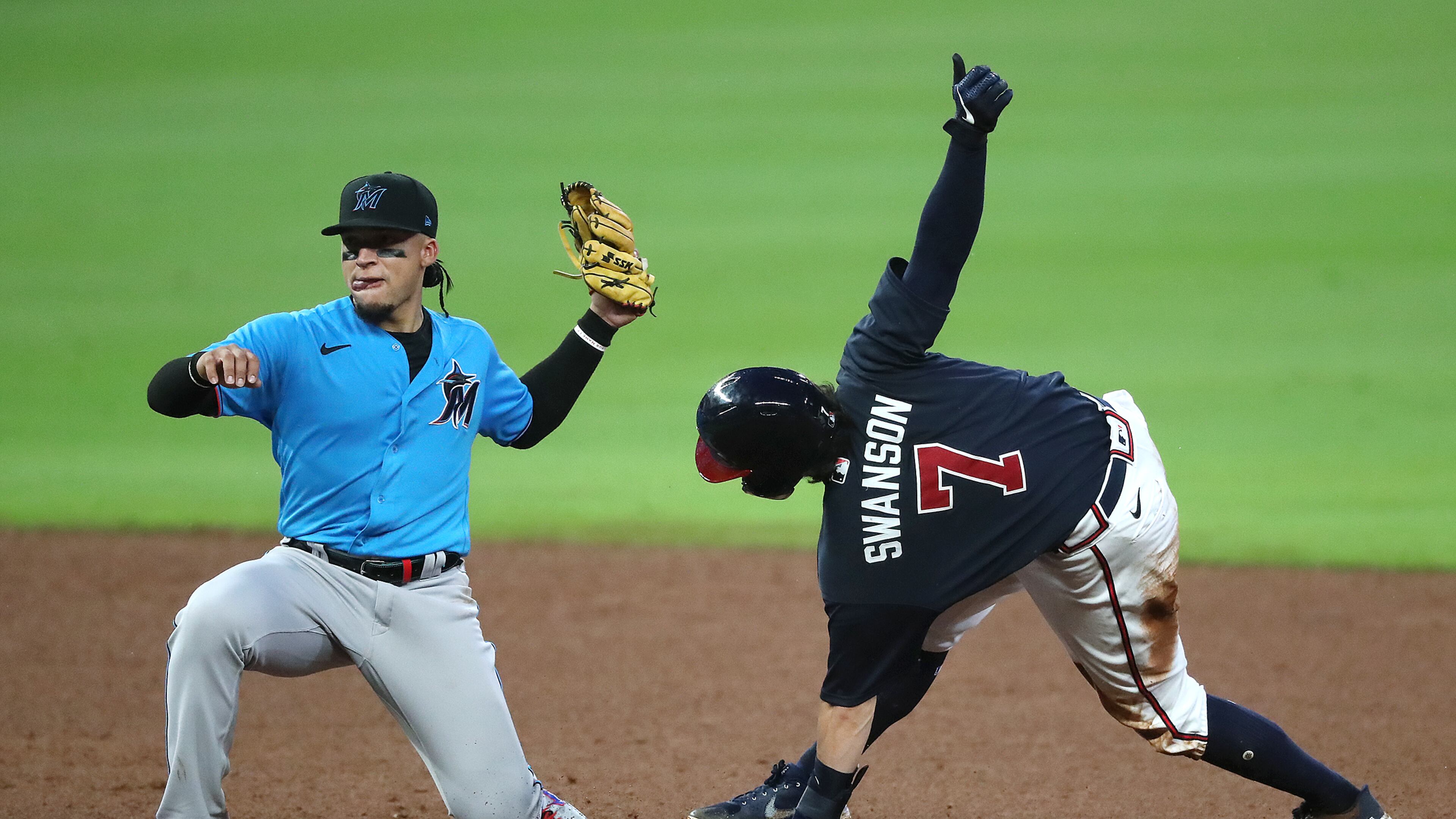Should MLB shut down? Maybe. Will it? Not yet

One weekend. That’s how long baseball managed to go without having to postpone a game because of COVID-19. That streak, if one weekend’s worth of games qualifies as such, ended Monday. The Marlins postponed their home opener for two compelling reasons.
1. As many as 14 players/coaches have tested positive.
2. Their team remains in Philadelphia under quarantine.
MLB saw positive tests during its summer camp – we around here know that better than most – but no teamwide outbreaks were reported. Some of that might have had to do to with testing diligence. Some, perhaps more, might have had to do with logistics. Until last week, no team had gotten on an airplane.
The Marlins flew here for exhibition games Tuesday and Wednesday. They proceeded to Philadelphia for the weekend. There’s thought that the first of their players might have been exposed to the virus in Atlanta. (Braves catcher Tyler Flowers, who started Tuesday’s game, didn’t accompany his team to New York for the regular-season opener, saying he felt sick. Also staying home was fellow catcher Travis d’Arnaud, who didn’t play in either exhibition. Neither has tested positive.)
Nearly half the Marlins’ active roster has tested positive, which surely means the other half will be quarantined for a while, which means … what?
One thing it means: The Phillies, who faced the Marlins three times over the weekend (and lost twice), won’t be working Monday, either. Their scheduled home game with the Yankees likewise was postponed. The Phillies must wait to see if any of their players test positive, and the Yankees weren’t thrilled about the idea of occupying the same clubhouse/dugout the Marlins just vacated. According to the New York Post’s Joel Sherman, the Yankees summoned their own clubhouse staff from New York, so as not to be around anyone who shared space with the Marlins.
One thing it doesn’t mean, at least not yet: That baseball’s shortened season already is doomed.
MLB folks aren’t the sharpest utensils in the cutlery rack, but they did have four months to game-plan for their delayed start. They knew there’d be positive tests. They assumed the virus – which is, duh, contagious – could wreak havoc with a given team or two. That’s why the pool of available players was set at 60, as opposed to 40. Even if the Marlins’ A-team is stuck in Philly for 10 days, their taxi squad, which didn’t travel with the other group, could be pressed into big-league duty.
The catch there: MLB would be asking one of its 30 franchises to play major-league games with essentially a minor-league roster. Would that be fair to the Marlins? Would it be fair to those National League teams that don’t face the JV Marlins but are competing for wild-card spots with the rest of the NL East?
Answers: no and no. At this moment, fairness isn’t uppermost in baseball’s corporate mind. The sport simply is trying to make it from day to day. To shut down now would mean shutting down for good. If you can’t make it past your opening weekend without stopping, where’s the hope for playing into October?
At this moment, MLB must trust its testing and its safety protocols. It also must persuade its players, who tend to distrust everything MLB says, not to take one outbreak as a signal that all teams are similarly fated. Those players, however, will cast a cold eye toward Sunday’s Marlins-Phillies game. Jose Urena, Miami’s starting pitcher, was scratched after testing positive. It was learned three teammates had, too. The game was played anyway. (No shock that Philly’s Bryce Harper masked up.)
With four positive tests in one visiting clubhouse, should commissioner Rob Manfred have moved to scrub Sunday’s game? In a perfect world, sure. But any sport opting to play during a pandemic knew positive tests would be the cost of doing business. Still at issue: How many positive tests will it take to stop?
As Marlins manager Don Mattingly said after Sunday’s game: “They can honestly refuse not to play, right? Everybody could opt out today. … I think it’s fair to say that guys are concerned about things, and they want their feelings to be heard. We’re talking about health, traveling back to their homes and their families and their kids.”
MLB won’t see the Marlins’ example, severe though it is, as cause to abort what took forever to get going. Players might see it differently. If enough of them say, “Not worth it,” the 60-game season would become the rough equivalent of the Triple-A playoffs, which nobody would want to watch – or televise.
I know this sounds crass – talking about ratings/money amid a health crisis. The belief here long has been that the attempt to stage ballgames while the virus rages is silly, but at last check, nobody has named me king of the world. It’s convenient today to suggest MLB should have insisted on an NBA-style bubble, but this ignores reality: Baseball was the FIRST to float a bubble scheme. Its players hooted it down. Nobody wanted to spend six months in Arizona.
I’ve never been sure that any start/restart will work. (Let’s see how the NBA bubble, flouted by Lou Williams’ weekend excursion to an Atlanta strip club, looks in a couple of weeks.) Do I believe baseball will make through October? No. Do I believe it will make it to October? No. But this I do believe: Having labored long to get going, MLB won’t halt itself in July.
There soon could come a time when stopping is the only sane option. In MLB’s mind, that time isn’t at hand.

